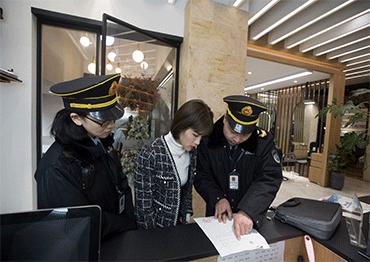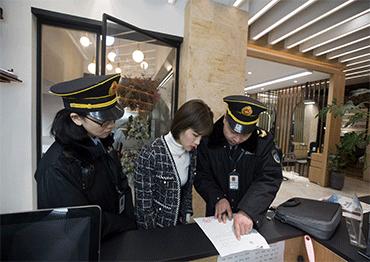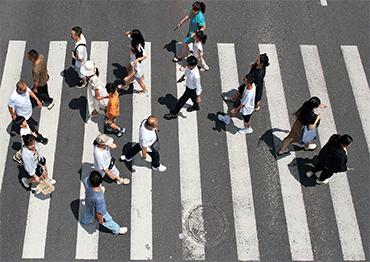On February 19, the State Council, China’s cabinet, released a directive to strengthen the regulation and supervision of administrative fine enforcement. Warning that excessive charges would weaken business confidence and undermine efforts to stabilize the economy, the directive stipulates that local governments must stop using illegal, irregular and unnecessary law enforcement monitoring equipment, such as excess use of traffic cameras.
The directive also establishes a mechanism for onsite inspection if revenue from fines in a place is found to be “abnormal” and stipulates that newly installed monitoring equipment must be reported to higher authorities to minimize the chance of electronic surveillance equipment from becoming a tool to make money.
Amid the economic slowdown caused by the global pandemic and its aftermath, debt-ridden local governments have increasingly imposed heavy fines for regulation violations to boost revenue. Such practices have led to widespread anger among the business sector and the public.
In August 2022, in Yulin, western Shaanxi Province, a small grocery shop owner surnamed Luo received a fine of 66,000 yuan (US$9,116) after a pack of celery worth 20 yuan (US$3) was found to have excessive pesticide residue. Similar cases have been reported across many regions, where small vegetable vendors were often fined tens of thousands of yuan for selling substandard produce.
In June 2023, a restaurant in Shanghai was fined 5,000 yuan (US$690) for adding shredded cucumber to one of its dishes without a license for cold dishes. Also in Shanghai, a cyclist posted on Xiaohongshu, a popular social media platform, in October 2023 that he received a fine of 2,900 (US$400) for violating traffic rules 58 times at a road junction between October 2021 and May 2023. He said he had not received a valid notification prior to this.
In Foshan, southern Guangdong Province, a single speed camera allowed local authorities to register 620,000 traffic violation cases and collect more than 120 million yuan (US$16.6m) in fines in 2021. A probe by higher authorities showed that the camera was installed where it was nearly impossible for any motorist to slow down and avoid crossing the solid line due to a short indication of a fork in the road.
In Chengwu County, eastern Shandong Province, traffic police launched an illegal scheme to collect fines. By paying a “monthly fine” of 1,000-2,000 yuan (US$138-$276), depending on the size of their truck, truck drivers could have “peace of mind” for the whole month regardless of how many times they violated traffic rules within the county. Police officers verbally communicated the details to drivers, local media reported. So far, there has been no follow-up on what happened to the officers.
While most of these exposed cases have been addressed by the authorities, with relevant fines canceled, they offer a glimpse into how local governments have turned to arbitrary fines to create much-needed revenue.
According to data released by the National Bureau of Statistics (NBS) on the agency’s website from 2017 to 2024, revenue from fines and confiscations by local government enforcement actions throughout China reached 368.7 billion yuan (US$51b) in 2022, up 71 percent from 2017. By comparison, overall local government revenue only increased by 18.9 percent over the same period.
In 2021, revenue from fines and confiscations at the local level jumped by 15.6 percent from the previous year. In 2022, revenue from fines increased further by 7.4 percent, in sharp contrast with the drop in both overall revenue and tax revenue at the local level, which declined by 2 percent and 8.5 percent, according to NBS data.
In response to growing public anger, the central government has acted. In 2022, the State Council sent inspection teams to different regions to stipulate the scope of fines that could be enforced at the local level.
The Xinhua News Agency reported in late 2022 that an inspection team sent to Xi’an, capital of Shaanxi Province, found a large number of administrative penalty categories in the city, with 934 administrative penalty items under market supervision departments alone. “Some penalty items are significantly detached from reality but have not yet been revised or abolished,” concluded the inspection team, “While some penalty items have been revised, local authorities are still enforcing them.”
In 2021, the province launched digital licenses to ease the process of checking, yet officers continued to fine businesses that did not display a printed license on their premises.
In August 2023, Chinese Premier Li Qiang signed a State Council decree unveiling revised administrative regulations, including those related to road transport, which revised, reduced and abolished fines for certain violations. In November 2023, the State Council announced the removal or adjustment of 33 types of penalties related to administrative regulations. Pledging to establish a coordinated punishment mechanism, the State Council said that misconduct related to the misapplication of fines would be seriously dealt with.
In a news conference held on February 28, Hu Weilie, deputy minister of justice, said the Ministry of Justice has strengthened the legal inspection of fine-related issues and has completed the cleaning up of 604 administrative regulations and fine-related items in departmental rules in 2023.
“During the rectification process, we found that some fines had no rational basis, and the implementation was not standardized, resulting in strong complaints from enterprises and the public against arbitrary fines,” Hu said, pledging that the ministry will endeavor to support the construction of a marketoriented, rule-of-law based and internationalized business environment.
But for many experts, the key to tackling the arbitrary collection of fines at the local level lies in curbing incentives for local governments to collect fines as a source of revenue.
According to Cai Lewei, associate professor from the law school of the China University of Political Science and Law, the fine-for-profit practices at the local level originated in a period when the performance of both government agencies and their staff was directly linked to the amount of fines they collected.
After China amended its law on administrative penalties in 2002, in which agencies imposing fines and those collecting the money had to be separated, fine-for-profit activities declined. But as these agencies still share the same financial revenue from the same local government, which can reward the agencies that impose the fines, the root cause of the fine-for-profit practices is far from being eradicated.
In the pre-pandemic boom days of industrial expansion and property development, local authorities did not need to rely so much on raising income in these ways. Now, after the property sector’s woes, fine-for-profit activities are on the up again.
Pi Jianlong, a partner at the Beijingbased Jintai Law Firm and a member of the Chinese People’s Political Consultative Conference (CPPCC), China’s top political consultant body, argued that to fundamentally address the problem, all proceeds from fine enforcement and collection should be submitted to the central government, which would cut the incentive for profit-driven rule enforcement.
Li Junmin, a lawyer from Beijingbased W&H Law Firm, however, argued for a more cautious approach.
Stressing that profit-oriented fines only account for a portion of all fines, Li warned that it is a double-edged sword to deprive local governments of revenue from penalties, which could lead to insufficient funding of local law enforcement agencies. This could push them to not actively enforce the law, since policing costs money too, which would no longer be covered by fine revenues.
Professor Cai shares this view. “It is not practical to transfer revenue from fines and confiscations at the local level to the coffers of the central government, as the matter is about the fundamental division of fiscal power and expenditure responsibility between central and local governments,” Cai told NewsChina.
Cai pointed out that the fine-related issue is very complicated, involving dozens if not hundreds of laws, and cannot be addressed with a holistic approach. For example, consider the controversial fines imposed on grassroots vendors for selling produce with excessive pesticide residues.
The minimum fine stipulated in China’s food safety law is 50,000 yuan ($6,900). Under the law, local authorities can either mete out a hefty fine or not enforce it. Cai said the only way to address the problem is to amend the law.
Issues like this fall into legal gray areas, where in rural areas or smaller towns, street vendors commonly sell their own produce, or that of their neighbors. Legal experts have urged that small grocery shops should not bear the brunt of these types of fines.
There are now rising calls among experts to amend certain laws to provide more specific guidelines and fine-tuned structures for law enforcement agencies to follow, as currently, they have too much discretion on what level of fines to impose, ranging from the low hundreds of yuan to tens of thousands.
But Professor Cai still believes that the most viable way to address the problem is to strengthen the supervision of local governments. “No law can provide detailed and specific regulations for every realistic situation, and it is inevitable that administrative agencies are granted discretion in enforcing and implementing the laws.”
This appears to be the central government’s approach. During the annual session of the National People’s Congress, China’s legislature, held in early March, the central government pledged to promote the vigorous development of the private sector. Curbing arbitrary fines is considered to be of the utmost importance in boosting the private sector’s confidence.
On March 30, the State Council announced it will conduct onsite inspections in 20 provinces and regions across China in April to examine their business environments.
The General Office of the State Council also urged private businesses to report tip-offs to the State Council’s online supervision platform if they feel they have been subject to arbitrary punishment.
Other than arbitrary fees and fines imposed by local government agencies, the announcement includes delays in business cancelation and relocation applications, unfair treatment to bidders, inconveniences in applying for certificates and services, and local governments’ failure to fulfill their commitments.
At a news conference held the same day, Geng Baojian, president of the Administrative Trial Division of the Supreme People’s Court, vowed that the court would strengthen its supervision of administrative agencies on the issue.
Stressing that disputes over administrative penalties accounted for 12.2 percent of all administrative lawsuits in 2023, ranking first, Geng said the court will supervise agencies to implement administrative penalties in a fair and open manner.
“Administrative penalties must comply with legal principles, as well as rationale and common sense,” Geng said.

 Old Version
Old Version

